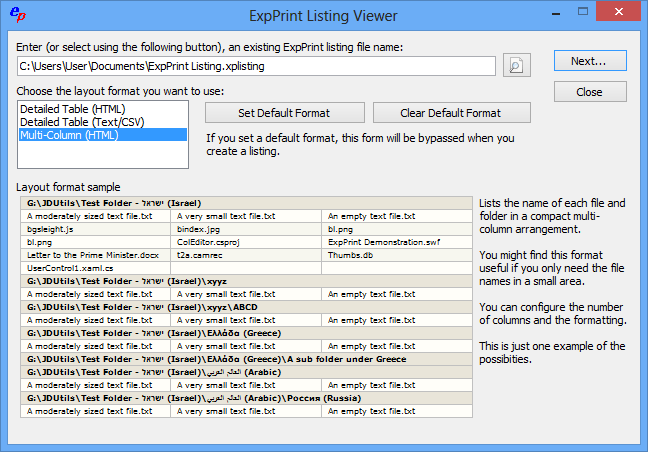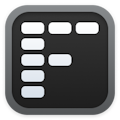ExpPrint is a commercial tool which integrates with Explorer and allows you to print, and save listings of files, directories, and virtual folders.
Once ExpPrint is installed, you can call it up to save the listings of any Explorer objects by selecting them, right-clicking and selecting "ExpPrint Listing...". The program wizard then appears to walk you through the process of saving your listing.
The first step is to choose your export format. The listing can be saved as a detailed table in HTML, text or CSV formats, or as a multi-column HTML file.
Next, you're able to customise the listing in considerable detail (in the full version, anyway - the settings are fixed in the trial build). There are a vast number of columns, including all the regular items (Name, Size, Type, Timestamps, Attributes, Owner), metadata, hash values (CRC32, MD5, SHA-1) and more. You can opt to exclude files or subfolders if they're smaller than a defined size. And you can configure indentation, time and date formatting, report styles and more.
Not sure how this will look? No problem - just click Next at any point and the formatted table will appear in your default browser. If you're unhappy, close the browser window and make some tweaks. And if all is well, then you can save these settings so you won't have to reconfigure the program next time.
Please note, this trial version has some limitations. As well as not allowing you to change its settings, ExpPrint will only list a single level of folder, not a full folder tree. Purchasing a licence will remove these restrictions.
Version 6.1.2.0 "adds new hash algorithms. ExpPrint can now generate hashes for CRC-32, MD2, MD4, MD5, SHA-1, SHA-256, SHA-386, and SHA-512."
Verdict:
Just being able to save a folder listing is a step beyond Explorer, but ExpPrint goes much further, and provides some very detailed and highly configurable reports









Your Comments & Opinion
Keep files synchronised between drives, computers and servers
Work with your files more effectively with this four-paned Explorer replacement tool
A four paned Explorer replacement tool
Keep the contents of folders synchronised for backup purposes
Easily access your favourite folders when opening and saving files
Print and save folder listings from Explorer
A powerful and flexible backup tool to protect your files for free
Free up valuable hard drive space with this fast and flexible duplicate file locator
Monitor your Windows event logs and PC system health from one central location
A notepad/ to-do tool with cloud sync
Analyze, search, back up, clean up, and generally get more from your hard drive with this suite of tools
Analyze, search, back up, clean up, and generally get more from your hard drive with this suite of tools